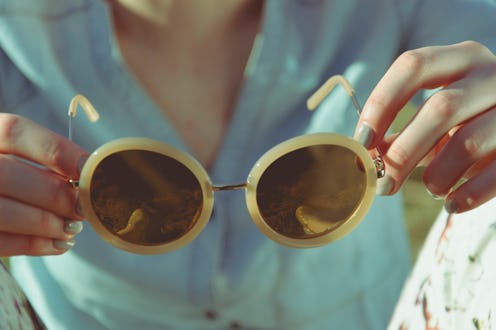Style
7 Tips For Selecting The Best Sunglasses For Your Eyes
Sunglasses are a fun way to accessorize during the summer (and the rest of the year for that matter). But if you're not careful, your sunnies may not actually be providing as much benefit as you need. Because not all sunglasses fully protect your eyes. So in honor of National Sunglasses Day, I emailed with Dr. Janelle Routhier, O.D., F.A.A.O., Senior Director of Customer Development at Essilor, who let me in on the dangers of not wearing eye protection, how much protection sunglasses can actually offer, and how to choose the best ones.
Turns out, the sun can cause some serious damage to your eyes. According to Dr. Routhier, long-term sun-damage to your eyes "can begin to accumulate in as little as 15 minutes." She explains that there is no healthy amount of UV radiation for the eyes, and "repeated exposure can increase your chances of developing eyelid skin cancer, cataracts, or experiencing temporary blindness." As if that weren't enough, she also tells me that "90-percent of visible, premature aging around the eyes is caused by UV damage." So if you want to save not only the skin around your eyes but your eyes themselves, protection against UV rays is imperative.
Because eye protection is so important, Dr. Routhier says doctors and eye-care professionals agree the best way to make sure you're totally covered is to combine wearing sunscreen, a wide-brimmed hat, and sunglasses. But not just any sunglasses will do. Here are seven tips for selecting the safest, most protective pair:
1. Wrapped Styles Offer More Protection
How your frames sit on your face can make a significant difference in the amount of protection you get. Dr. Routhier says styles like aviators that sit away from the face allow more light to reach your eyes from the sides, back, and top of the frame, but wrapped styles that fit more snugly against your face will offer better UV protection from all of those angles. So if you plan on spending prolonged time in the sun, she recommends selecting a wrapped frame for your sunnies.
2. Take Dark Lenses With A Grain Of Salt
Although Dr. Routhier says that generally speaking, darker lenses allow less light to penetrate and are therefore more protective against UV rays, the style of your dark sunglasses can really affect how much the sun can damage your eyes. She explains that the darker your glasses are, the more your pupils will dilate, which allows in more light. So if your eyes aren't fully protected from all angles, darker lenses could actually let more UV light in your eyes, increasing your risk of sun damage.
3. Be Wary Of Flat Lenses
To prevent light from sneaking in your eyes around the sides, top, and back of your sunnies, Dr. Routhier warns against sporting flat lenses or zero-base lenses during prolonged sun exposure. This style, she says, does not offer good optics because you sacrifice the quality of your vision and the quality of sun protection from a standard, curved lens.
4. Polarized Lenses Are Key
"While tinted sunglasses are OK for reducing brightness, they don't eliminate harsh glare," says Dr. Routhier. To prevent having to squint even while wearing sunnies, she recommends always opting for polarized lenses as they will eliminate glare that reflects off of roads, water, sand, and even snow.
5. The Bigger, The Better
Because your frames can offer a certain level of protection, there really is no harm in going for bigger sunnies, says Dr. Routhier. In fact, bigger is better. The larger and wider the lenses, frames, and arms of your sunglasses are, the more UV protection they will offer.
6. Look For An Anti-Reflective Treatment
"Up to 50-percent of UV rays that reach the eyes come from reflection off the back surface of the lens," says Dr. Routhier. To better protect your eyes, it's important that your lenses are not only coated with a UV-protective treatment on the front, but they should also have an anti-reflective treatment on the back, she explains.
7. Check The UV Protection
When in doubt though, search for a sticker or tag on sunglasses that says how much UV protection the pair offers. If it doesn't provide at least 98-percent protection against both UVA and UVB rays, says Dr. Routhier, keep looking for a pair that actually provides the protection your eyes need and deserve.
